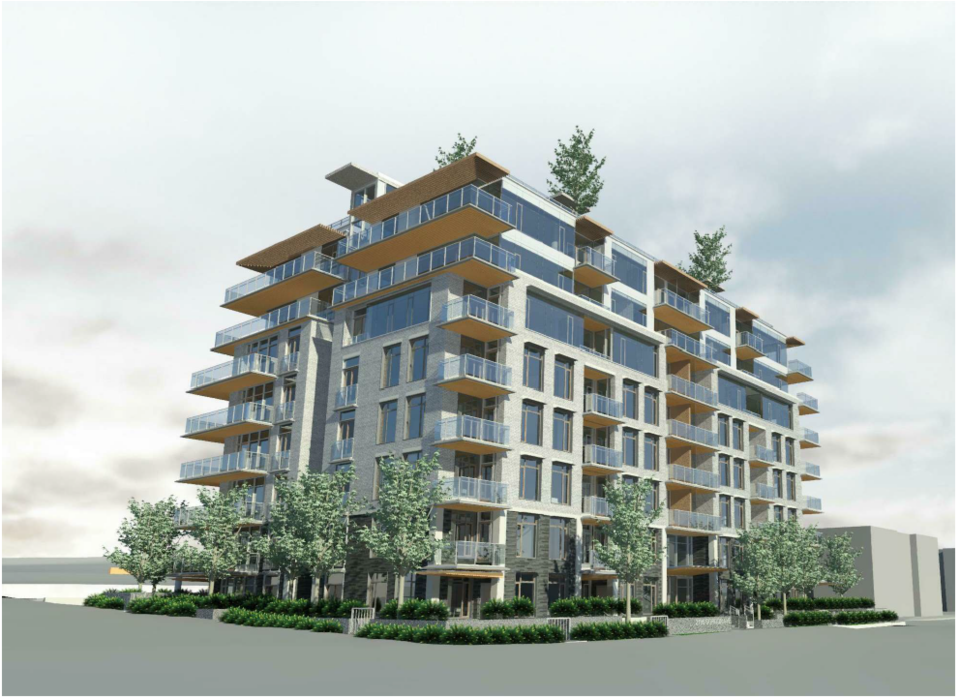District of West Vancouver council is dotting the i’s and crossing the t’s on a plan to lease out two plots district owned land at 2195 Gordon Ave. and proceed with a mixed below-market rental, adult day centre and strata condo project.
Council voted 5-2 Monday (June 13) evening to lease the southern portion of the land to developer Darwin Properties for 99 years in exchange for $22.195 million. The northern portion of the site will be leased to the Kiwanis North Shore Housing Society, which will provide the affordable housing and seniors respite, for 60 years at a rate of $1 per year.
The district bought the land from Vancouver Coastal Health in 2014 for $16.4 million with proceeds the district acquired from the sale of the former West Vancouver Police Department property on Marine Drive.
In July 2020, council voted to rezone the properties to allow for an eight-storey, 50-unit strata project on the south side, and 165 below-market rentals, which will be offered at an average of 70 per cent of market rates, putting them in reach of households earning $50,000 to $120,000 per year. In order to be eligible to live in one of the below-market homes, renters must demonstrate they have a strong connection to the community, either through their work, family or by already living nearby. If their income climbs above the eligibility cap, they may be evicted.
Darwin and Kiwanis were chosen through an open bid process. All that was left procedurally was for council to go through the legal mechanism for disposition of the land, which requires further public consultation. Although the long-term leases were largely supported, based on public feedback, the process did stoke some familiar pushback, with the proposal going back to 2018.
Over the course of an hour before the vote, supporters urged council to get on with their long-held plans to develop the land in a way that benefits the local workforce. Detractors questioning the process said council should either pause the project, put it to a referendum or start consultations on other affordable housing models. A common theme was that West Vancouver would be leaving money on the table by leasing the land to Kiwanis, rather than flipping it for full market value.
Deputy chief administrative officer Mark Chan, however, said the council’s objective has never been to maximize the financial return from the Vancouver Coastal Health site.
“Council and the district have been very clear since 2018 and through all of our public consultation, that the goal was to optimize the use of the site to deliver on multiple policy objectives: To provide additional housing supply and below-market housing to moderate-income people and an adult day centre while generating a reasonable return with no ongoing cost to the district,” he said.
Mayor Mary-Ann Booth said she was proud of the 38-per-cent return on investment, while delivering affordable housing and an adult day centre, and retaining the land for future generations.
“I think it's pretty good business planning,” she said.
Couns. Peter Lambur and Sharon Thompson both voted against the project, largely because they would have preferred the district pursue a different model of affordable housing. Thompson said she’d like to see the district build a co-op or rent-to-own project at the site that would allow its future residents to gain financial equity. Lambur suggested the district sell the land and use the cash to fund housing that is more affordable.
“I'm, of course, not going to support this thing, not because I don't believe in the project. Instead, I think we're missing an opportunity to make it that much better and to work this project a little harder to even further diversify the housing choices that we could develop in this community,” Lambur said.
Coun. Craig Cameron, however, warned his council colleagues against “falling in love with the hypothetical.”
“There's a bad tendency to say, well, it could be something better," he said. "These are hypothetical projects that don't actually exist in reality. The reality is each project requires trade-offs and the trade-offs on this project are, I think, well worthwhile. And we can immediately turn our sights to our next piece of land and see if we can use a different model on that piece of land.”



